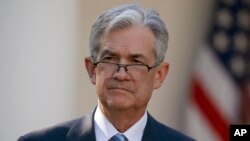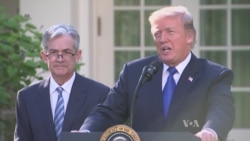President Donald Trump has named moderate former investment manager Jerome Powell as the new head of the Federal Reserve Board, the U.S. central bank.
Introducing Powell Thursday at the White House Rose Garden, the president called it another milestone in bringing back a strong economy for the American people.
Powell has been on the Fed board of governors since 2012. Trump says he has the "wisdom and leadership" to guide the U.S. economy through any challenge it may face.
WATCH: Trump Names Jerome Powell New Fed Chief
He praised Powell as a consensus builder and noted Powell always had strong bipartisan support in the Senate when he was nominated to the board of governors.
Powell was a former undersecretary of the treasury under Present George H. W. Bush, and Trump said he understands what it takes for the economy to grow.
Powell said he is honored and humbled to be nominated. He said if he wins Senate conformation, he will do everything in his power to stabilize prices and maximize employment.
Analysts call Powell a Republican centrist who appears inclined to continue the Fed’s strategy of gradually raising interest rates.
While Powell is expected to continue outgoing chair Janet Yellen's cautious approach to raising interest rates, economists say he might relax some of the financial rules designed to prevent another financial crisis like the one that caused chaos in the markets during the 2007-2008 recession.
Trump has complained that those rules hurt banks and economic growth. Yellen, who was selected as Fed chair by President Barack Obama, has been an outspoken advocate for the stricter financial regulations that took effect in 2010.
Trump had words of high praise for Yellen, whose term expires in February. He called her a "wonderful woman" who has done a "spectacular job."
Yellen is a Democrat, though, while Powell, like Trump, is a Republican, and although the president likes and respects Yellen, he has said he wans to "make his own mark."
The Federal Reserve's basic function is controlling the U.S. money supply by setting interest rates under which banks can borrow and lend money. It operates independently from the rest of the government.






